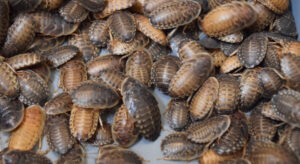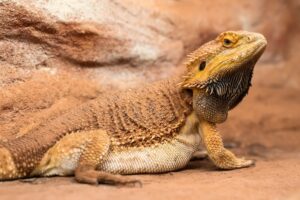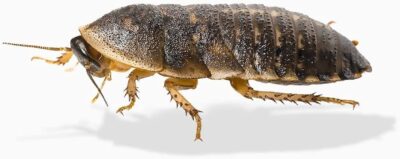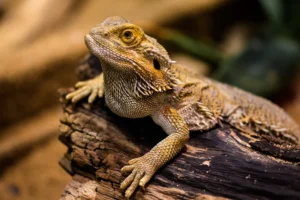Dubia roaches for bearded dragons have emerged as a popular and nutritious feeder insect choice among reptile enthusiasts. With their rich nutritional profile and ease of maintenance, Dubia roaches have become a staple diet for these beloved pets.
In this article, we delve into the world of Dubia roaches, exploring their benefits, how to care for them, and why they are an excellent choice for the health and well-being of your bearded dragon. Whether you’re a seasoned reptile keeper or a novice owner, understanding the significance of Dubia roaches in your bearded dragon’s diet is crucial for their overall health and happiness.
Dubia roaches for bearded dragons

Dubia roaches are a popular feeder insect for bearded dragons due to their nutritional value and ease of care. They’re rich in protein and low in fat, making them a great staple food for these reptiles. Additionally, they have a soft exoskeleton, which makes them easier for bearded dragons to digest compared to harder-shelled insects like crickets.
When feeding Dubia roaches to your bearded dragon, it’s essential to provide a varied diet to ensure they get all the nutrients they need. You can offer other feeder insects like crickets, mealworms, superworms, and even occasional treats like hornworms or silk worms.
Remember to dust the Dubia roaches with calcium and vitamin supplements before feeding them to your bearded dragon, as this helps prevent nutritional deficiencies and ensures your pet stays healthy.
Also, always make sure the Dubia roaches you feed are appropriately sized for your bearded dragon to avoid any choking hazards or digestion issues.
Benefits of Dubia Roaches for Bearded Dragons
Dubia roaches offer several benefits as a feeder insect for bearded dragons:
- Nutritional Value: Dubia roaches are high in protein, which is essential for the growth and development of bearded dragons. They also contain other nutrients like calcium and vitamins, which are crucial for maintaining overall health.
- Low Fat Content: These roaches have a low-fat content compared to some other feeder insects like waxworms or butterworms. This makes them a healthier option for bearded dragons, helping to prevent obesity and related health issues.
- Soft Exoskeleton: Dubia roaches have a soft exoskeleton, making them easier to digest for bearded dragons compared to insects with harder shells like crickets. This can reduce the risk of impaction, a common digestive issue in reptiles.
- Ease of Gut Loading: Gut loading is the process of feeding nutritious foods to feeder insects before offering them to the bearded dragon. Dubia roaches are easy to gut load with a variety of fruits, vegetables, and commercial gut-loading diets, ensuring that they pass on essential nutrients to your pet.
- Longevity: Dubia roaches have a longer lifespan compared to other feeder insects like crickets, meaning they can be kept alive for longer periods without the need for frequent restocking. This can be convenient for reptile owners who prefer to keep feeder insects on hand.
- Low Maintenance: Dubia roaches are relatively easy to care for and require minimal maintenance compared to other feeder insects. They don’t produce noise or odor, making them suitable for keeping in the home.
Overall, Dubia roaches are a nutritious, easy-to-digest, and convenient feeder insect option for bearded dragons, making them a popular choice among reptile enthusiasts.
Feeding Dubia Roaches to Bearded Dragons
Feeding Dubia roaches to bearded dragons is a great way to provide them with a nutritious and varied diet. Here’s a step-by-step guide on how to feed Dubia roaches to your bearded dragon:
- Acquire Healthy Dubia Roaches: Purchase Dubia roaches from a reputable supplier to ensure they are healthy and free from pesticides or parasites. Avoid collecting them from the wild, as they may carry diseases or toxins.
- Proper Housing: If you plan to keep Dubia roaches to feed your bearded dragon regularly, set up a separate enclosure for them. A plastic or glass container with smooth sides and a secure lid works well. Provide them with a substrate like egg crates, paper towels, or cardboard tubes for hiding and climbing.
- Gut Loading: Before feeding Dubia roaches to your bearded dragon, it’s essential to gut load them with nutritious foods. Offer them a variety of fruits, vegetables, and commercial gut-loading diets for at least 24 hours before feeding them to your pet. This ensures that the roaches are packed with essential nutrients.
- Dusting: Dust the Dubia roaches with calcium and vitamin supplements just before feeding them to your bearded dragon. This helps ensure your pet receives all the necessary nutrients for optimal health. You can use a commercial reptile supplement powder and lightly coat the roaches by shaking them in a bag or container with the powder.
- Feeding: Offer the dusted Dubia roaches to your bearded dragon using feeding tongs or by placing them directly in their enclosure. Bearded dragons are visual hunters, so moving the roaches around can stimulate their natural hunting instincts. Offer an appropriate number of roaches based on your dragon’s size and age, usually a few at a time.
- Monitor: Keep an eye on your bearded dragon while they eat to ensure they are consuming the roaches without any issues. Remove any uneaten roaches after feeding to prevent them from bothering your pet or hiding in the enclosure.
- Variety: While Dubia roaches can be a staple feeder insect for bearded dragons, it’s essential to offer a varied diet. Supplement their diet with other feeder insects like crickets, mealworms, superworms, and occasional treats like hornworms or silk worms to ensure they receive all the necessary nutrients.
By following these steps, you can provide your bearded dragon with a healthy and balanced diet that includes Dubia roaches as a nutritious feeder insect option.
Proper Sizing of Roaches Based on Bearded Dragon Age



